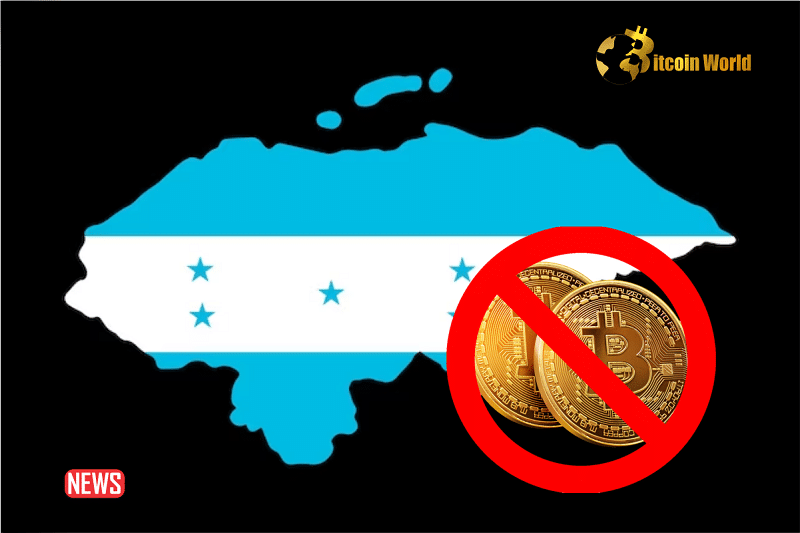Just when you thought crypto adoption was steadily marching forward, a curveball gets thrown! Honduras, a country with pockets of crypto enthusiasm, has just put the brakes on banks dealing with digital currencies. The National Banking and Securities Commission (CNBS), the financial watchdog in Honduras, has officially barred banks under its purview from engaging in anything crypto-related. Let’s dive into what this means for the crypto landscape in Honduras and beyond.
What Exactly Did Honduras’ Financial Regulator Do?
In a move that has sent ripples through the crypto community, the CNBS issued a resolution clearly stating that Honduran banks are prohibited from “maintaining, investing, intermediating or operating with cryptocurrencies, crypto assets, virtual currencies, tokens or any other similar virtual asset.”
In simpler terms, if you’re a bank in Honduras, you can’t touch crypto. This isn’t just about Bitcoin; it encompasses all forms of cryptocurrencies and digital assets. Think of it as a ‘crypto-free zone’ for traditional financial institutions within the country.
Why the Sudden Crypto Clampdown?
The CNBS isn’t shy about its reasons. They’re waving the red flag of risk, citing the usual suspects when it comes to crypto skepticism:
- Unregulated Nature: Cryptocurrencies operate largely outside traditional financial regulations, making them, in the eyes of regulators, a bit of a Wild West.
- Fraud Concerns: The decentralized and sometimes anonymous nature of crypto can make it a playground for fraudsters.
- Money Laundering & Terrorism Financing: Regulators worry that crypto can be used to obscure illicit funds and activities.
Essentially, the CNBS is prioritizing the stability and security of the traditional financial system, and they see crypto as a potential threat in its current form. This resolution effectively slams the door on banks, investment firms, and similar institutions participating in the crypto market in any capacity – be it holding, investing, or processing crypto transactions.
See Also: This Is How Chinese Crypto Traders Have Been Bypassing The Crypto Ban
Honduras: A Land of Crypto Contradictions?
Here’s where it gets interesting. Honduras isn’t exactly a crypto desert. In fact, it’s home to:
- Bitcoin Valley: A project aimed at making Santa Lucía a Bitcoin hub, encouraging businesses to accept crypto.
- Próspera Special Economic Zone: Within Próspera, Bitcoin is legal tender! This zone operates with a degree of autonomy, embracing crypto in a big way.
So, you have these pockets of crypto-friendly initiatives thriving in Honduras, even as the central bank and now the CNBS express caution. The central bank itself has previously warned against crypto use and is exploring the possibility of launching its own central bank digital currency (CBDC). It seems there’s a push and pull between embracing crypto innovation and maintaining traditional financial controls.
What Does This Mean for Crypto in Honduras?
While this is undoubtedly a setback for mainstream crypto adoption in Honduras, it’s important to note a few things:
- Crypto Exchanges Unaffected: The ban targets regulated financial institutions. Crypto exchanges, which often operate outside this regulatory perimeter, can likely continue to function in Honduras.
- Decentralized Crypto Initiatives Continue: Projects like Bitcoin Valley and Próspera, with their decentralized nature, may be less directly impacted by this banking ban.
- Focus on CBDC?: Honduras might be leaning towards exploring its own digital currency as a more controlled and regulator-friendly alternative to decentralized cryptocurrencies.
However, the move certainly restricts the avenues for average Hondurans to interact with crypto through their traditional banks. It could slow down broader crypto adoption and potentially push crypto activities further underground or towards less regulated platforms.
Disclaimer: The information provided is not trading advice. Bitcoinworld.co.in holds no liability for any investments made based on the information provided on this page. We strongly recommend independent research and/or consultation with a qualified professional before making any investment decisions.
#Binance #WRITE2EARN
The Bottom Line: Crypto Regulation – A Global Balancing Act
Honduras’ decision highlights the ongoing tension between embracing crypto innovation and managing the perceived risks. Countries worldwide are grappling with how to regulate digital assets, and there’s no one-size-fits-all approach.
While some nations are welcoming crypto with open arms, others are taking a more cautious stance, prioritizing investor protection and financial stability. Honduras seems to be leaning towards the latter, at least when it comes to its traditional banking sector. The future of crypto in Honduras will likely depend on how these contrasting approaches – crypto-friendly zones versus regulatory caution – play out in the long run.
Disclaimer: The information provided is not trading advice, Bitcoinworld.co.in holds no liability for any investments made based on the information provided on this page. We strongly recommend independent research and/or consultation with a qualified professional before making any investment decisions.


